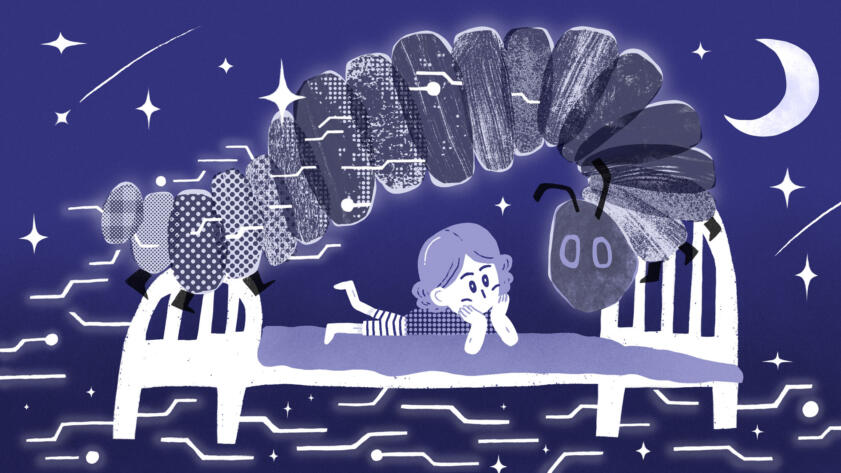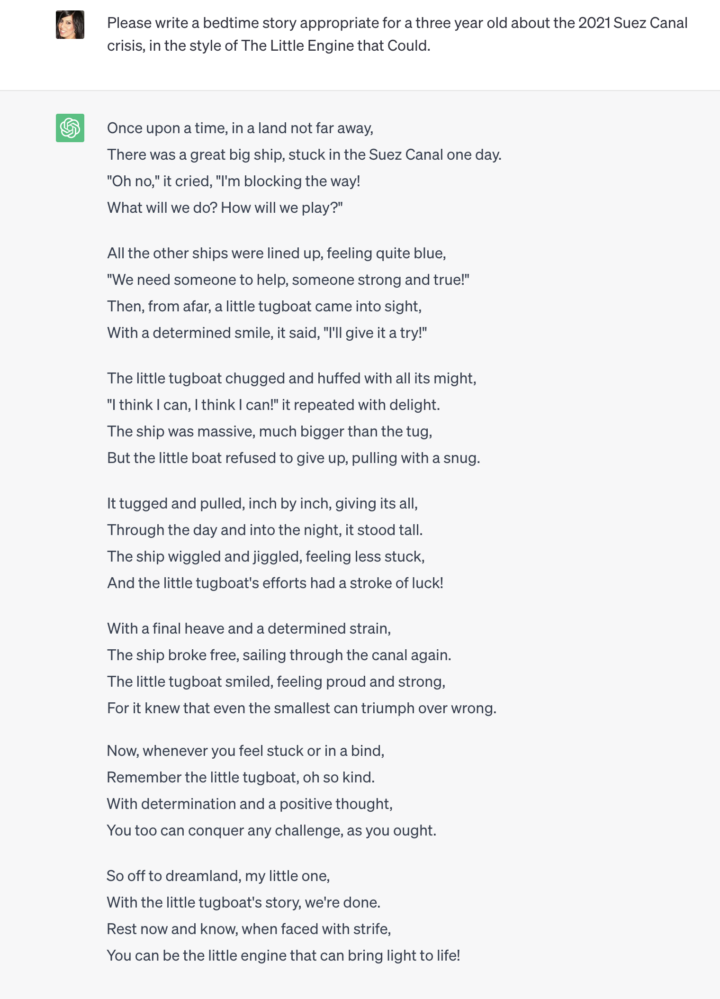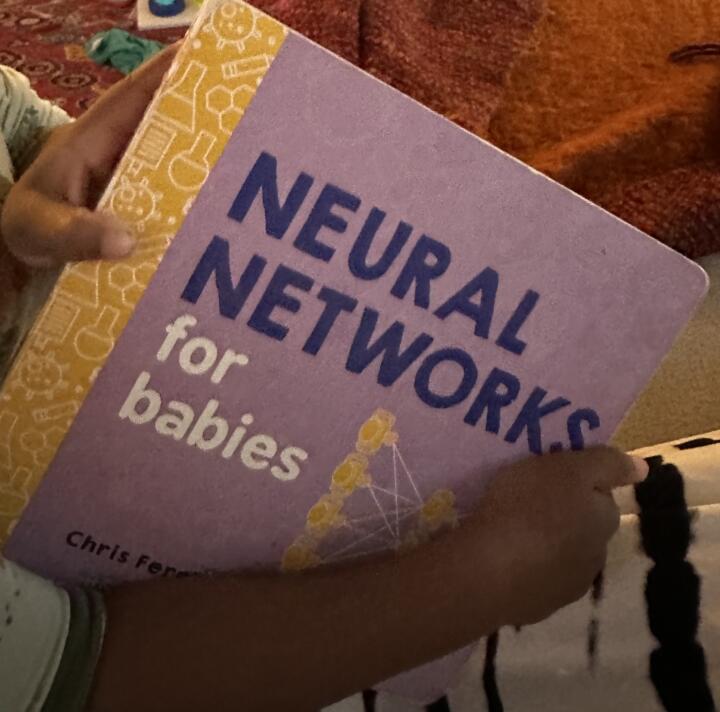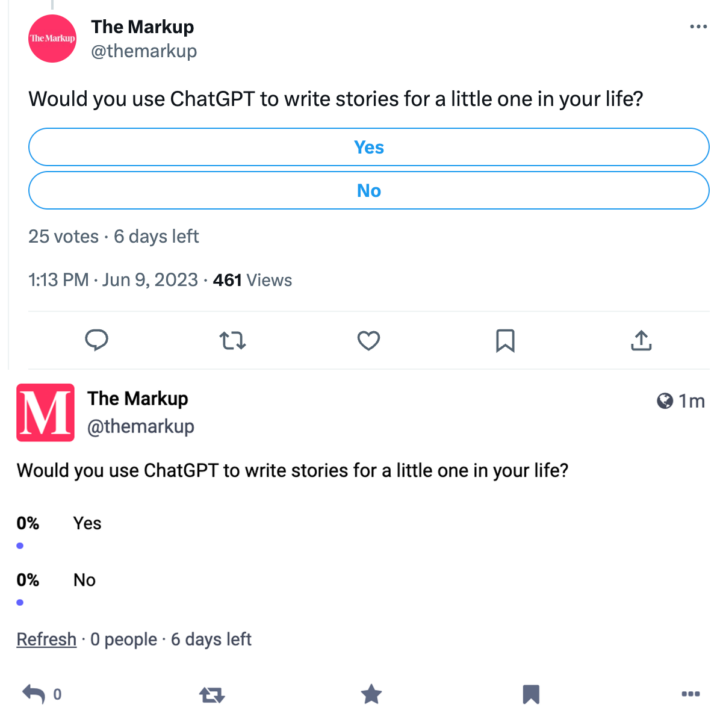Subscribe to Hello World
Hello World is a weekly newsletter—delivered every Saturday morning—that goes deep into our original reporting and the questions we put to big thinkers in the field. Browse the archive here.
Stop me if you’ve heard this one before: Toddlers love bedtime stories. Some kids like to reread the same story every night, and others, like my 3-year-old, love novelty. For him, there’s nothing like the surprise from a brand-new book—thank goodness for libraries!—and if that weren’t enough, he also asks for one bespoke story every night, tailored especially to him. Six months ago, completely out of the blue, he asked for a “chat story.”
“You want a chat … story?” This was new.
“Chat story. From your phone,” said the little dictator.
“You want a story from my phone?” Parenting a toddler is kind of like living in a phone tree with no operator.
“Chat. Story. In the phone. Type!”
Puzzled, I forged ahead with a made-up story about the virtues of eating one’s entire dinner and called it a night. I made a note to ask his teacher the following week, and imagine my surprise when I learned his teacher had been experimenting with ChatGPT to generate custom stories for the class. Like 14 percent of American adults, I’d played around with ChatGPT by then, but this was an excitingly practical application. Bedtime turned into a wild version of Mad Libs: Prompt a few nouns or concepts, pop it into the easy chat interface, pick a style (“in the style of Berenstain Bears” worked well), and lo and behold—a perfectly serviceable bedtime story. What could go wrong?
In case you want to give it a shot, here is my child’s favorite prompt so far: “Please write a bedtime story appropriate for a three year old about the 2021 Suez Canal crisis, in the style of The Little Engine That Could.” Yes, we have an odd sense of humor in this household.
But as ChatGPT-generated stories put my kid right to sleep, I lay awake, wide-eyed, thinking about how conflicted I felt.
My first reaction was enthusiasm. What an opportunity to have early familiarity with disruptive technology—and to learn how to treat it as an assistive tool. At The Markup, we think a lot about how our expertise means we can ask better questions, and here I was at bedtime, helping my child see how framing your question in different ways yields different answers. Consider it Prompt Engineering 101. It also felt oddly familiar: I played around with AOL, Homestead, and Altavista as a kid, and I credit that early experimentation with so much of my career. If my child will graduate into a world surrounded by AI systems, why not gain early familiarity and fluency?
My adventures in bedtime ChatGPT are in good company. Arvind Narayanan, who we interviewed earlier this year to help decode the hype around AI, set up a voice interface for ChatGPT with his 3-year-old and observed the learning capabilities for his daughter as well as some risks around chatbots. AI-generated stories are also a promising and cost-effective way to create materials for kids with autism, as Maryland-based child psychologist Cindy Graham told HuffPost.
My enthusiasm was quickly tempered by swirling ethical concerns—especially around educational inequity, compensating creative work, and environmental impact.
As schools ban, unban, and try to figure out how to best use generative AI, will zero-tolerance policies be weaponized against vulnerable students? Who will be scrutinized and policed, and who—like my son—will be encouraged to experiment and gain AI literacy? We need to think hard about these dynamics, especially in schools with preexisting enforcement cultures.
It’s not lost on me that two-thirds of the world’s school-aged children don’t even have internet at home, according to a 2020 UNICEF report. As AI takes root in our lives, will it widen the chasm between those who have access to such technology and those who do not? Educational inequity is fueled by uneven access to the internet. The social and legislative response to new technologies ought to reflect that reality now—not just hype around nightmare scenarios.
Of course, there are also questions around the training data for generative AI, which is precisely what enables you to ask for a story in the style of Berenstain Bears or Hans Christian Andersen. Much of that training data was acquired, collated, and used without explicit consent, drawing criticism from artists like Molly Crabapple who fear AI will be used to replace creative craft. AI-generated books are already flooding Amazon, though they’re not exactly “Goodnight Moon” quality. Still, I want to live in a world where we continue to value and reward human creativity. (This issue is live in the ongoing WGA strikes, too.)
I also just want to live in the world, period. I write this from the orange hellscape of New York City, where smoke from Canadian wildfires has me glugging as much water as I can—not unlike ChatGPT, which consumes a 500-ml bottle of water for a short conversation of roughly 20 to 50 questions and answers. Multiply that across ChatGPT’s huge user base, and the total water footprint is enormous. Mitigating this environmental impact feels urgent and yet curiously missing from the legislative debate around AI.
Surprisingly, privacy wasn’t a marquee concern for me—only because I don’t craft prompts with personal information or specific facts about my kid’s life, which is also a practice I communicate with him clearly. It feels far easier to navigate the privacy concerns here than it does on ed tech platforms that harvest data.
Here’s the thing: A roller coaster of feelings around disruptive technology is exactly right. We should normalize feeling uncomfortable as we apply our ethics to unfamiliar situations—and frankly, that’s more realistic than reflexively embracing or dismissing any innovation. To help explore these issues, The Markup will be hosting Q&As with various experts in and around AI, some with perspectives we agree with and others with ones we’d like to challenge. (If there’s a topic that interests you, reply to this email and let us know!)
In the meantime, I’m not giving up my library card.
Thanks for reading!
Nabiha Syed
Chief Executive Officer
The Markup
Respond to our poll on Twitter or Mastodon!
Further reading:
- Princeton computer science professor Arvind Narayanan decodes the hype around AI
- A map of high-speed internet access disparities across the U.S.
- Calculating the secret water footprint of AI queries
- The great AI copyright debate
- The college-prep software that allows targeted advertising to its users
P.S. If you liked this exploration, stay tuned for an event in the fall titled “Back to School with ChatGPT.” In the meantime, here’s a parent’s guide that might be helpful.







